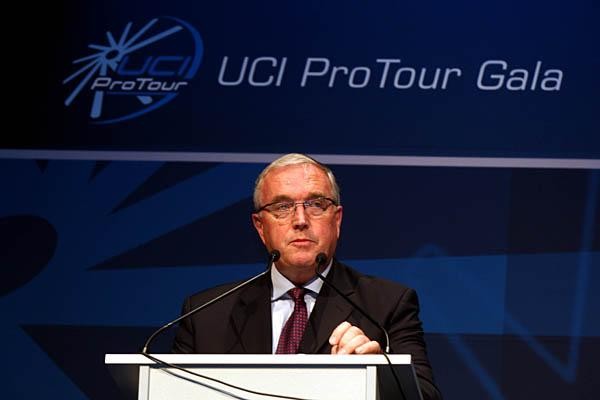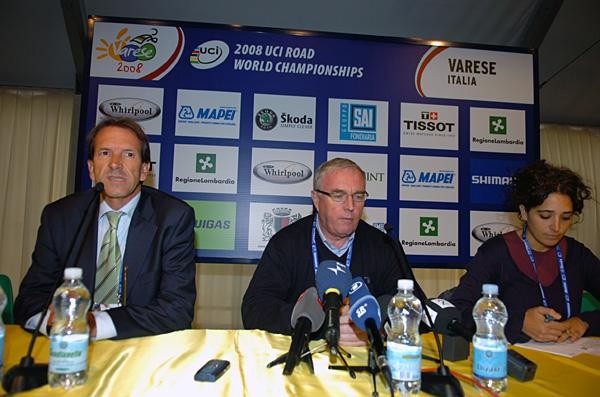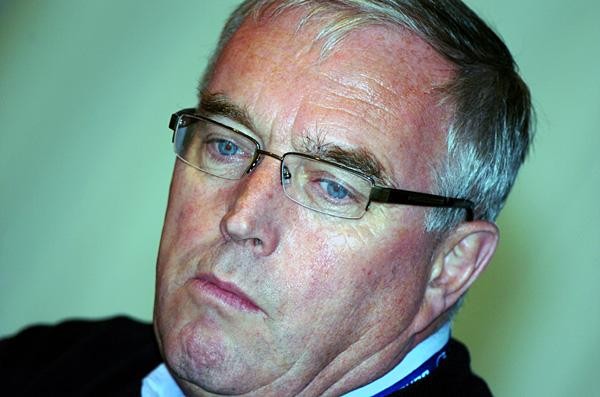McQuaid pleased with peace deal
At the UCI's press conference on Saturday at the world championships in Varese, Pat McQuaid has...



World Championships feature, September 28, 2008
ProTour changes take effect as of 2011
At the UCI's press conference on Saturday at the world championships in Varese, Pat McQuaid has expressed his satisfaction with the peace deal that has been forged between the governing body and the Grand Tour organisers. As previously mentioned on Cyclingnews, Editions Philippe Amaury (EPA, owner of Tour de France organiser ASO), Giro d'Italia owner RCS and Vuelta a España owner Unipublic signed an agreement with the UCI on Thursday, ending the long disputes over the ProTour and other issues.
"Things have been worked out now," said McQuaid. "The agreement has been signed, and the pathway for the future has been laid out.
"We agreed the large part of the agreement back in August, and since then we have been working on the last points. Jean-Claude Killy [former president of ASO - ed.] and the other mediators were involved right until the very end."
The change in the French company's stance was pushed forwrad by Marie-Odile Amaury, the widow of the deceased Philipppe Amaury, who repaired her company's damaged ties with the UCI via the International Olympic Committee.
McQuaid, who will again be candidate for the UCI presidency election taking place next year, was confident that relations between the three Grand Tour organisers would be rebuilt over the coming months. "It is now a question of working together with the organisers and rebuilding relationships. My desire is that relations with the Tour go back to the way they were a few years ago. I genuinely feel that the people we are dealing with in EPA are sincere, honest, and have the same desires as us."
Get The Leadout Newsletter
The latest race content, interviews, features, reviews and expert buying guides, direct to your inbox!
McQuaid added that he hadn't yet spoken directly with Tour director Christian Prudhomme, having dealt directly with his superiors in the EPA, but expects to do so at the launch of the Tour de France.
Officials at ASO, a company owned by EPA, have not yet responded publicly to the news. While changes at the top management level of ASO have been rumoured to be true for weeks, nothing to date has been made official.
The peace deal also meant that the suspension of the French federation FFC was lifted. Procedures underway against the President of the FFC, Jean Pitallier, and the President of the AIGCP, Eric Boyer and the International Commissaire Joël Ménard at Paris-Nice were also brought to an end, setting things up for a far more relaxed meeting between the UCI and all its federations on Friday.
"I was extremely happy about the agreement on Thursday evening, as it meant that we went to congress on Friday and were able to reintegrate the French federation," McQuaid commented.
ProTour, version 2.0
McQuaid also confirmed that the ProTour would continue as part of the UCI's new World Calendar, and that the system would be subject to some amendments as of 2011. "We're working on a points and ranking system for the World Calendar, which will take effect from 2011 onwards. As you know, ASO signed a contract with the teams for 2009 and 2010 - and within our agreement, we respect that contract. So we can only bring in this new structure from 2011 onwards."
The president of the UCI elaborated further. "The obligation is on the organisers of the ProTour races to take the ProTour teams. Likewise, the ProTour teams are obliged to ride the ProTour races. But there will be a points ranking system, that will see the top 17 teams automatically selected for the Grand Tours and for the ProTour races." This would mean a more flexible participation system for the big races also based on performance factors - an important concern voiced many times in recent years by the race organisers.
A close collaboration between the Grand Tour organisers and the governing body was announced to determine the details of the ranking system. "The race organisers will send delegates to collaborate with us in our work groups and our commissions to study the different aspects of the development of cycling in the future," McQuaid added. "To be more concrete: We started this week with the first work group on the points ranking system. They had a meeting this week, and there will be more meetings until the end of the year. The other work groups will also get underway before the end of the year, and I hope that by then, we will have a first draft for the future system of elite cycling."
McQuaid felt that the ProTour had achieved certain goals in the last three years, whilst others had been left to theory because of the conflict. "Those projects include the bundling of the TV rights of the ProTour events - and I emphasize ProTour events. There are a couple of race organisers in cycling, who make large sums of money from their events, and that's success to them; but there are many organisers even of high-level events that are seriously struggling to make ends meet." While the UCI president did not want to get into any details regarding the agreement, this suggested that the TV rights of the Grand Tours - the sticking point of the conflict since the very beginning - remained with their respective organisers.
The main concern of McQuaid was, once again, to increase the globalisation of cycling. "The UCI will do a study over the next year on what is the best way forward for elite level cycling - taking all of the factors into account which are necessary to us in order to compete with all of the other major sports, many of whom are globalising at a very rapid rate," he added.
Even though several teams have recently questioned or handed back their ProTour licence, McQuaid hoped the system would work in the future. He again defended the ProTour as the only way to "combine the requirements of the security of sponsorship with the sporting requirements of access into big races. Once we find a way to combine both, we're on the right path."
And he underlined that even a reduced number of ProTour teams next year would not stop the UCI's will to move forward with the system, which plans to take top level professional road racing to Russia and China. "I strongly feel that we need around 16, 18 big, strong teams that are well-administered, well-developed with a stable sponsorship of a long duration to develop the sport globally. Even if there are only ten ProTour teams next year, we will build on that anyway, in the years to come."